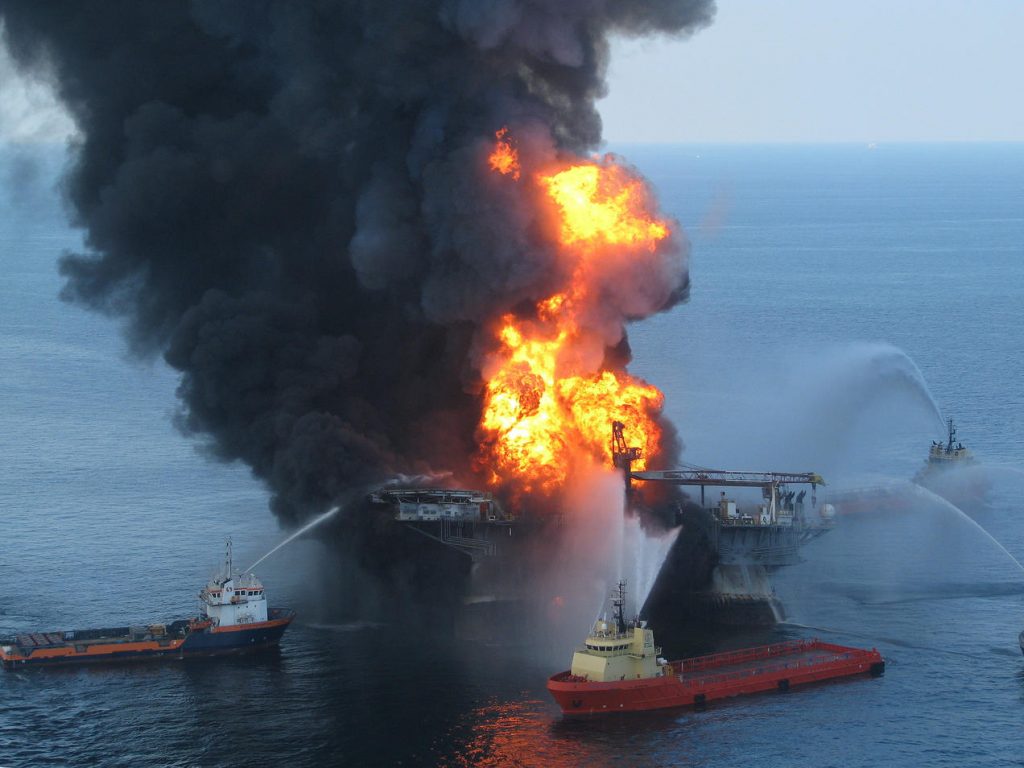Offshore drillers don’t have to follow safety rules, and an EPA official says Congress should stop asking so many questions (about how she’s not doing her job).

Response crews battle the blazing remains of the Deepwater Horizon rig on April 21, 2010
Oil Not Gone, but Forgotten
How is Donald Trump’s memory? Not particularly good, if he apparently can’t remember the worst oil spill in U.S. history, which happened almost nine years ago. In a deadly offshore drilling accident in the Gulf of Mexico, BP’s Deepwater Horizon rig exploded on April 20, 2010, and was just about the only thing in the news for months, while its underwater well continued to gush 5,000 barrels of oil into the gulf every day. Remnants of the oil are still undermining gulf ecosystems nearly a decade later. The rig’s faulty blowout preventer led to the deaths of 11 people, and, as of this January, the total cost of the disaster was $65 billion.
President Obama, who days before the spill had claimed that offshore rigs were very unlikely to spill, was rightfully chastened. Obama convened a panel of experts, and after years of wrangling, his administration implemented several of the panel’s safety recommendations, including improvements to blowout preventers and more regular and reliable inspections. The goal was to prevent another disaster.
This past December, however, the Trump administration proposed rolling back many of those rules while massively expanding offshore drilling—basically begging for a repeat of Deepwater Horizon, or a slightly different disaster on a similar scale. The changes would reduce regulators’ ability to monitor offshore drilling and, unbelievably, rescind the requirement that ensures proper inspection of blowout preventers.
A rollback of such safety precautions is a terrible idea, but at least it is subject to important procedural requirements. The administration has to provide a logical explanation for its proposal, the public gets to see and comment on the changes, and courts then review every step in the process before the rules can be formally relaxed. But the Trump administration may prefer to relax the rules immediately, so oil companies can get a head start on the $900 million in savings the rollbacks promise them.
Politico reports this week that since the summer of 2016, the Bureau of Safety and Environmental Enforcement (BSEE) has granted 1,700 waivers to the offshore drilling safety rules. The total includes the last few months of the Obama administration, but the former BSEE director under Obama tells Politico that given the newness of the rule, it’s unlikely that many of the waivers predated Trump’s inauguration. While we don’t know yet the timing of each waiver, the most common one granted allows oil companies to forego—you guessed it—the rule that ensures proper inspection of blowout preventers.
Drillers have been receiving these waivers for over two years, so why are we just learning about them now? Because the BSEE isn’t required to tell the public when and why it decides to let oil companies use poorly inspected blowout preventers. Put simply, this is a way to effectively weaken offshore drilling safety rules without going through the legally mandated administrative process.
The secrecy surrounding the waivers also means that the BSEE doesn’t have to tell us its acceptance rate for waiver applications. It could approve every single application it receives from offshore drillers asking to waive safety rules, and we wouldn’t know. However, the House Natural Resources Committee is now demanding answers. Stay tuned.
EPA Enforcement Chief Is Doing a Great Job at Failing
Susan Bodine, the top enforcement official at the U.S. Environmental Protection Agency, appeared before Congress this week to attempt the impossible: defending the Trump administration’s actions on combating pollution.
The agency’s record is damning in the extreme. From the day President Trump took office, the EPA’s enforcement officers basically went into a work slowdown. Environmental enforcement actions declined significantly in Trump’s first few months compared with both the Obama and George W. Bush administrations, and fines dropped 60 percent relative to the previous three administrations.
In her testimony this week, Bodine argued that these numbers give a false picture of the EPA’s enforcement activity. She touted the administration’s focus on self-reporting and bizarrely claimed that the mere act of publicly questioning the agency’s resolve was giving succor to polluters.
I can see why Bodine may have been taken aback by the harsh line of questioning. What she experienced is called oversight—something the Trump administration will have to get used to now that Congress isn’t stuffed with its yes-men.
More important, objective data prove that the EPA’s soft-glove approach doesn’t work. The agency publishes the volume of pollutants and hazardous waste that its actions remove annually from the environment. On average, the Trump EPA has eliminated just one-eighth the amount of pollution that had been reported for the nine preceding years. These facts are not in dispute, and Bodine can’t defend them. Any other administration would have fired an enforcement chief with such a shoddy record. Yet Bodine seems to be doing exactly what Trump wants—looking the other way on lawbreakers. (Not even puppies can catch a break in this administration.)
Stay up-to-date on Trump’s environmental antics by visiting NRDC’s Trump Watch.
